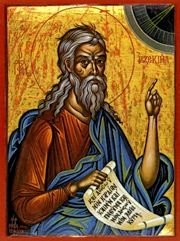The Shakers: an American take on an ancient tradition
 Last week Iowa Public Television aired Ken Burns' documentary on the Shakers. I liked Ken Burns' series on the history of baseball so I was eager to see this short documentary.
Last week Iowa Public Television aired Ken Burns' documentary on the Shakers. I liked Ken Burns' series on the history of baseball so I was eager to see this short documentary. From Wikipedia:
The Shakers, a Protestant religious denomination, originated in Manchester, England in 1772 under the leadership of Mother Ann Lee, who moved the 9-person group to the United States in 1774. They built 19 communal settlements that attracted over the next century some 200,000 converts. Strict believers in celibacy, Shakers maintained their numbers through conversion and adoption of orphans. Turnover was very high; the group reached maximum size of about 6,000 full members in 1850, and now has four members left. [1]
The Shakers (or, "shaking Quakers") were so named because of their peculiar rite of trembling, dancing, shaking, shouting, and speaking in tongues. I grew in my admiration for this group when I heard their testimony. Their founder and later members all had a great sincerity and desire to live out the Gospel in a radical way. They lived a life of simplicity. Their buildings and clothing were simple and austere. They considered their daily routine of work and craftsmanship as acts of prayer... and as such, they strove for beauty and perfection. They considered their vow of celibacy to be an attempt to live a life more perfectly configured to Jesus Christ (who was celibate). I wondered whether or not they had sound theological motives for their practice of celibacy (of course, some Christian sects in history have made celibacy mandatory for false reasons--such as the heresy that creation, the body and sexual intercourse were evil). One current day Shaker remarked that the Shaker way of celibacy was not for everyone... that some were called to motherhood and fatherhood... otherwise "there would be no more new Shakers!" It interested me to know that the Shaker view of celibacy seemed to match the Catholic understanding.
I was also impressed by what one Shaker woman said was the defining characteristic of the Shakers: the familial love that was expressed and felt. The Shakers took in orphans and adult seekers who felt called to the community. They even hinted at the fact that their celibate lives contributed to this ability to see every member as one's brother or sister.
People flocked to see and hear the strange "liturgy" of movement and the heavenly singing of the Shakers at worship. Once again, what struck me was how all of the Shakers and all of the historians spoke of this religious phenomenon as if it was the first such movement in the history of Christianity since the dawning of the apostolic age. Had they never heard of the long and rich history or men and women relgious movements in the Catholic Church? For centuries, Catholics had been living out the evangelical counsels of poverty, obedience, and chastity in a myriad of beautiful ways. Think of the austere life of the Cistercian monks... the Trappists. St. Benedict himself spoke of ora et labora (prayer and work)... and certainly, he considered daily work to be part of the "prayer without ceasing" which St. Paul called us to. Of course, we also see the call to sanctify the world through the holiness of ordinary work in St. Josemaria Escriva's Opus Dei movement. St. Therese of Lisieux--the little Flower--spoke of finding holiness in ordinary daily activities in her "little way." The list goes on and on.
One historian remarked that the genius of American Protestantism was that no one could tell someone else how to experience God (once again, the idolatry of anti-authoritarianism and individual freedom). There was a freedom to venture on such religious experiements such as the Shakers did. Of course, what few people apparently realize is that the road that the Shakers tread was blazed by the innumerable religious orders of the Catholic Church before them.
More on the Shakers:
http://www.pbs.org/wnet/ihas/icon/shakers.html
http://religiousmovements.lib.virginia.edu/nrms/Shakers.html
http://en.wikipedia.org/wiki/Shakers
Labels: religious history, religious life


<< Home